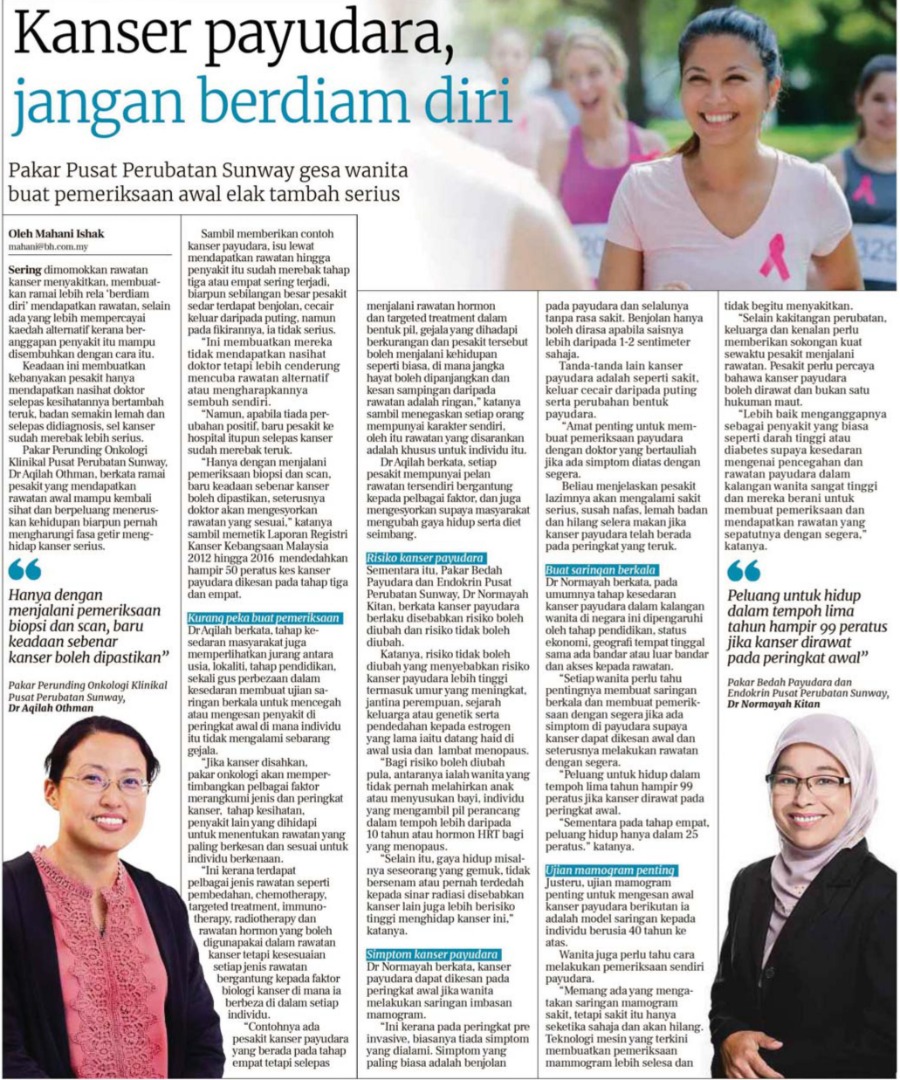Don't Keep Quiet About Breast Cancer
04 October 2021

Cancer treatment is often perceived as painful, making many willing to keep quiet than seek treatment. Some even believe in alternative methods, thinking that the disease can be cured that way. This causes patients to only seek medical advice when cancer cells have spread.
Sunway Medical Centre Consultant Clinical Oncologist, Dr Aqilah Othman said many patients who received early treatment are able to return to their healthy self and continue to live normal lives despite having undergone cancer treatment.
Breast cancer is one cancer that is often detected after it has spread to Stage 3 or 4, although many are aware of the signs such as a lump and unusual discharge but assumed it was not serious. Dr Aqilah said there is a gap in awareness between age, locality and education in doing regular screening to prevent or detect diseases at early stage when it is still asymptomatic.
"Patients are more likely to try alternative treatments or expect it to heal on its own and when there are no positive outcomes then they come to hospital when the cancer has spread. The true condition of cancer can be ascertained through a scan or biopsy which then the doctor will recommend the most suitable treatment," Dr Aqilah said, citing the Malaysian National Cancer Registry Report 2012 - 2016 which revealed almost 50% of breast cancer cases are detected at Stage 3 and 4.
"The oncologist will consider a number of factors including the type and stage of the cancer, health level and other diseases which the patient may have to determine the most effective treatment. This is because there are various types of treatments including surgery, chemotherapy, targeted treatment, immunotherapy, radiotherapy and hormone treatment but the suitability of each treatment depends on the cancer which differs in each individual.
"For example, there are Stage 4 breast cancer patients who lead normal lives after undergoing hormone treatment and targeted treatment through pills. Their life expectancy is extended and side effects from treatment are mild," she adds, saying that treatment is personalised for each individual.
Meanwhile, Sunway Medical Centre Breast and Endocrine Surgeon, Dr Normayah Kitan said breast cancer occurs due to modifiable and non-modifiable factors. Non-modifiable factors that cause a higher risk of breast cancer include age, being female, family history or genetics and long-term exposure to estrogen (experiencing menstruation at an early age and late menopause).
"As for factors that can be changed, among them are women who have never given birth or breastfed, individuals who have taken birth control pills for more than 10 years or HRT hormones for those who are menopausal. Besides that, lifestyle factors such as obesity, lack of exercise or being exposed to radiation due to other cancers are also at high risk of developing breast cancer," Dr Normayah said.
Mammogram testing is important for early detection of breast cancer especially for women aged 40 years and above. They also need to know how to self-examine their breast.
"Some people say that mammogram screening is painful, but the pain is only temporary. The latest technology makes mammogram screening more comfortable and less painful. There are usually no symptoms in the pre-invasive stage and the most common symptom is a lump in the breast that is often painless. The lump can only be felt when it is more than 1-2 cm in size. Other signs of breast cancer are pain, unusual discharge and changes in breast shape. It is important to do breast examination with a doctor immediately if there are any of the above symptoms," Dr Normayah said, adding that patients would experience serious pain, shortness of breath, weakness and loss of appetite if their breast cancer is at a more severe stage.
In general, the level of breast cancer awareness among women in the country is influenced by their education level, economic status, geography of residence whether at the urban or rural area and access to treatment.
“Every woman needs to know the importance of regular screening and go for a check-up immediately if there are any symptoms in the breast for cancer to be detected early and treated immediately. The chance of survival within 5 years is almost 99% if cancer is treated at an early stage. While at Stage 4, survival rate is only 25% per cent.
"Medical staff, family and acquaintances need to provide strong support to patients while they undergo treatment. Patients need to believe that breast cancer can be treated and is not a death sentence.
“It is better to consider cancer as a common disease like high blood pressure or diabetes so that the awareness about breast cancer prevention and treatment among women will increase and they are willing to come forward for screening and get proper treatment," Dr Normayah said.
Source: Berita Harian
Back




